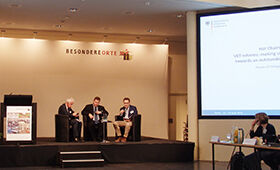EU partner countries set themselves new goals
2012 Berlin Memorandum achieves a positive overall outcome
15.06.2016
Just over three years after the signing of the Berlin Memorandum, representatives from Germany, Greece, Italy, Latvia, Portugal, and Slovakia met to attend a multilateral workshop at educational policy level. The aims of the event, which was attended by the signatory ministries of education and national authorities, were to review the success of the Memorandum and officially launch a multilateral peer learning platform.

From 23 to 25 May 2016, representatives of the six countries which are signatories to the 2012 Berlin Memorandum convened in the same city to look back at VET cooperation thus far and to discuss the design of a European “peer learning platform”. In concluding the Memorandum, the partner countries had committed to working together to develop approaches towards reducing youth unemployment and improving transition to the labour market. The main focuses were on implementation of dual or workplace-based training, on increasing the attractiveness and quality of vocational education, on modernisation of training systems and on integration of the social partners into the respective VET system.
Germany and its partners took the implementation process seriously. Bilateral working groups were founded in order to foster exchange of information and networking on the part of all stake-holders involved and to steer cooperation in policy terms. Since 2013, GOVET has been acting in conjunction with the partners on behalf of the BMBF to organise numerous study trips, specialist workshops and conferences, to implement pilot projects, to conduct feasibility studies, to draw up materials for training courses and to prepare reports and evaluations. The BMBF has funded nu-merous projects via locally based German chambers of commerce and industry abroad as part of the VETnet Project. In the individual countries, implementation has taken place at varying speeds and with different emphases in line with respective needs and political necessities. BMBF Depart-mental Head Volker Rieke stressed that the first phase had come to an end and called upon col-leagues to undertake a critical evaluation of what had been achieved.
During lively exchanges of views on the “hot chair”, country representatives spent three sessions responding to questions on the challenges of necessary legal reforms, on the development of qual-ity in the continuing training of VET staff and in connection with cooperation between learning venues, something which remains difficult in many countries. Slovakia, for example, indicated that it had fast-tracked statutory re-regulation in a way that involved all relevant stakeholders. Italy has introduced a two-level law which stipulated vocational orientation in all schools and higher VET at specialised upper secondary schools. The significant factor is that dual elements or practical phases are firmly established in law as an option to other vocational school choices within the educational system. In other countries such as Greece, this has also led to a gradual route towards system improvement that builds on national traditions and experiences.
The object of debate in the second session was the key role played in a high-quality vocational ed-ucation and training system by VET staff at schools and companies. Both Latvia and Portugal use fully trained teachers as VET staff. Advanced and continuing training courses are also offered, which in Portugal, for example, are important for career advancement. An even more significant factor, however, is expansion of the pedagogical competences of company-based training staff. In both countries, this takes place via continuing training courses. Within the scope of the German-Portuguese cooperation agreement, Portugal has developed a 35-hour continuing training scheme for this purpose, which possibly may soon be included in the National Qualifications Catalogue. Latvia has recognised that cross-border networking, especially with companies, is important in terms of fostering teachers’ understanding of technological processes. This topic formed the main focus of the third session, in which the most important mechanisms for cooperation between schools and companies in Greece, Italy and Germany were discussed. Participants in the debate felt that a thoughtful approach towards any sort of reforms was necessary at all times since many stakeholders needed to be integrated and a shift in societal mentality occurred only slowly.
The first day concluded with a panel discussion which involved Ladislav Chudý, Head of Human Resources from MANZ AG/Nové Mesto nad Váhom, part of the Slovakian “Cooperative Training” pilot project, Kerstin Josupeit, project head of “Verbundberatung Berlin”, and Carsten Bredow, a senior manager at the Berlin-based cooperative “Malzfabrik”. It became clear how special support mechanisms for small and medium-sized companies can serve as a vehicle for overcoming hurdles related to curriculum adaptation, accreditation, partner search and coordination of training. Participants in the discussion also outlined examples of good practice for training their own young skilled workers. Also evident was that it was scarcely possible to acquire SME’s to provide com-pany-based training without initial investments and state tax breaks. The unanimous view here was that a strong independent body to assist companies with organisation, such as a chamber, was also helpful.
The final day was devoted to realignment of the forum. An atmosphere of trust prevailed as coop-eration mechanisms deployed in past years were examined under the heading of “lessons learned”. The discussions of all participants produced highly positive feedback in this regard, particularly in respect of the instruments used. A further object of debate centred on the fact that and method via which this forum could also send out important practical signals to the EU Commission in its capacity as a multilateral peer learning platform. Everyone agreed that the format should continue and that a further meeting should be held at the end of the year. The intention is that at least one annual meeting should be staged in the various countries.